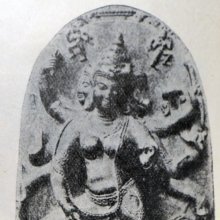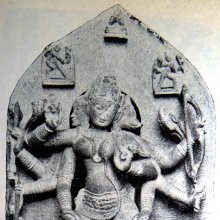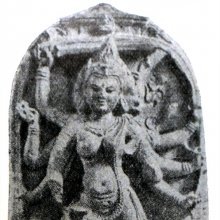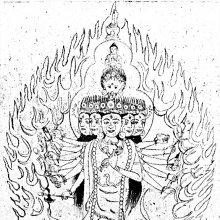Varali, Varalī, Varāli, Vara-ali, Vaṟaḷi: 11 definitions
Introduction:
Varali means something in Buddhism, Pali, Hinduism, Sanskrit, the history of ancient India, Marathi, Tamil. If you want to know the exact meaning, history, etymology or English translation of this term then check out the descriptions on this page. Add your comment or reference to a book if you want to contribute to this summary article.
The Sanskrit term Vaṟaḷi can be transliterated into English as Varali or Varalii, using the IAST transliteration scheme (?).
Images (photo gallery)
In Buddhism
Tibetan Buddhism (Vajrayana or tantric Buddhism)
Source: archive.org: The Indian Buddhist IconographyVarālī (वराली) refers to one of the fur attendant goddesses of Aṣṭabhujamārīcī (or Mārīcīpicuvā) or the eight-armed variety of Mārīcī, who represents one of the various emanations of Vairocana, as mentioned in the 5th-century Sādhanamālā (a collection of sādhana texts that contain detailed instructions for rituals).—[...] Accordingly, Aṣṭabhuja-Mārīcī is surrounded by the four attendant goddesses, Varttālī, Vadālī, Varālī and Varāhamukhī. [...] Varālī is identical with Vadālī, except that she holds the vajra and the needle in the two right hands and the noose and the Aśoka in the left.

Tibetan Buddhism includes schools such as Nyingma, Kadampa, Kagyu and Gelug. Their primary canon of literature is divided in two broad categories: The Kangyur, which consists of Buddha’s words, and the Tengyur, which includes commentaries from various sources. Esotericism and tantra techniques (vajrayāna) are collected indepently.
India history and geography
Source: What is India: Inscriptions of the ŚilāhārasVaralī (वरली) is the name of a village mentioned as lying on the southern border of the Uppalapallikā hamlet, according to the “Ṭhāṇā plates of Mummuṇirāja”. Uppalapallikā, a hamlet of Vīrāra, seems to have merged itself in Vīrāra.
These copper plates (mentioning Varalī) were discovered in 1956 while digging the ground between the Church and the District Office at Ṭhāṇā, the chief town of the Ṭhāṇā District in Mahārāṣṭra. Its object is to record the grant, by the Śilāhāra Mummuṇirāja, of some villages and lands to learned Brāhmaṇas on the occasion of the lunar eclipse on the fifteenth tithi of the bright fortnight of Phālguna in the Śaka year 970, the cyclic year being Sarvadhārin.

The history of India traces the identification of countries, villages, towns and other regions of India, as well as mythology, zoology, royal dynasties, rulers, tribes, local festivities and traditions and regional languages. Ancient India enjoyed religious freedom and encourages the path of Dharma, a concept common to Buddhism, Hinduism, and Jainism.
Languages of India and abroad
Marathi-English dictionary
Source: DDSA: The Molesworth Marathi and English Dictionaryvarāḷī (वराळी).—f The name of a drug.
--- OR ---
vāraḷī (वारळी).—m A jungle tribe, or an individual of it, in Northern Konkan̤. See an interesting account of this people in Dr. Wilson's Evangelization of India. pp. 268-284.
Marathi is an Indo-European language having over 70 million native speakers people in (predominantly) Maharashtra India. Marathi, like many other Indo-Aryan languages, evolved from early forms of Prakrit, which itself is a subset of Sanskrit, one of the most ancient languages of the world.
Sanskrit dictionary
Source: DDSA: The practical Sanskrit-English dictionaryVarāli (वरालि).—the moon.
Derivable forms: varāliḥ (वरालिः).
Varāli is a Sanskrit compound consisting of the terms vara and āli (आलि).
Source: Cologne Digital Sanskrit Dictionaries: Edgerton Buddhist Hybrid Sanskrit DictionaryVarālī (वराली).—name of a yoginī: Sādhanamālā 277.2 (prose) etc.; compare prec.
Source: Cologne Digital Sanskrit Dictionaries: Shabda-Sagara Sanskrit-English DictionaryVarāli (वरालि).—m.
(-liḥ) 1. The moon. 2. A division of music.
Source: Cologne Digital Sanskrit Dictionaries: Monier-Williams Sanskrit-English Dictionary1) Varāli (वरालि):—[from vara] m. the moon, [Horace H. Wilson]
2) [v.s. ...] a [particular] Rāga, [Horace H. Wilson] (cf. varāḍī).
3) Varalī (वरली):—[from varala > vara] f. = varaṭā, [cf. Lexicographers, esp. such as amarasiṃha, halāyudha, hemacandra, etc.]
Source: Cologne Digital Sanskrit Dictionaries: Yates Sanskrit-English DictionaryVarāli (वरालि):—[varā+li] (liḥ) 2. m. The moon; a division of music.
[Sanskrit to German]
Sanskrit, also spelled संस्कृतम् (saṃskṛtam), is an ancient language of India commonly seen as the grandmother of the Indo-European language family (even English!). Closely allied with Prakrit and Pali, Sanskrit is more exhaustive in both grammar and terms and has the most extensive collection of literature in the world, greatly surpassing its sister-languages Greek and Latin.
Kannada-English dictionary
Source: Alar: Kannada-English corpusVarāḷi (ವರಾಳಿ):—[noun] (mus.) in Karnāṭaka system, the thirty ninth of the seventy two main musical modes (rāgas).
Kannada is a Dravidian language (as opposed to the Indo-European language family) mainly spoken in the southwestern region of India.
See also (Relevant definitions)
Starts with: Varali Pala, Varalika, Varalikai, Varalimancal, Varalittanam.
Ends with (+4): Adivarali, Alakavarali, Dramidavarali, Himduvarali, Huvarali, Jogivarali, Kannadavarali, Kokilavarali, Kumtalavarali, Lakshavarali, Nagavarali, Nakavarali, Pamtuvarali, Peyvarali, Pratapavarali, Prathamavarali, Punnagavarali, Punnakavarali, Purvavarali, Samavarali.
Full-text: Varalittanam, Nakavarali, Varali Pala, Antali Pala, Varalimancal, Pamtuvarali, Varahamukhi, Ghanaraga, Kanarakam, Varttali, Vadali, Irakam, Maricipicuva, Vinai, Uppalapallika, Virara, Gola.
Relevant text
Search found 3 books and stories containing Varali, Varalī, Varāli, Vara-ali, Vaṟaḷi, Varāḷī, Varālī, Vāraḷī, Vāralī, Vara-āli, Varāḷi; (plurals include: Varalis, Varalīs, Varālis, alis, Vaṟaḷis, Varāḷīs, Varālīs, Vāraḷīs, Vāralīs, ālis, Varāḷis). You can also click to the full overview containing English textual excerpts. Below are direct links for the most relevant articles:
The Indian Buddhist Iconography (by Benoytosh Bhattachacharyya)
Stupas in Orissa (Study) (by Meenakshi Chauley)
Emanations of Vairocana < [Chapter 5]
Muthuswami Dikshitar < [November 1938]
Triple Stream < [April – June, 2002]
The Nada Yoga of Tyagaraja < [January 1965]



